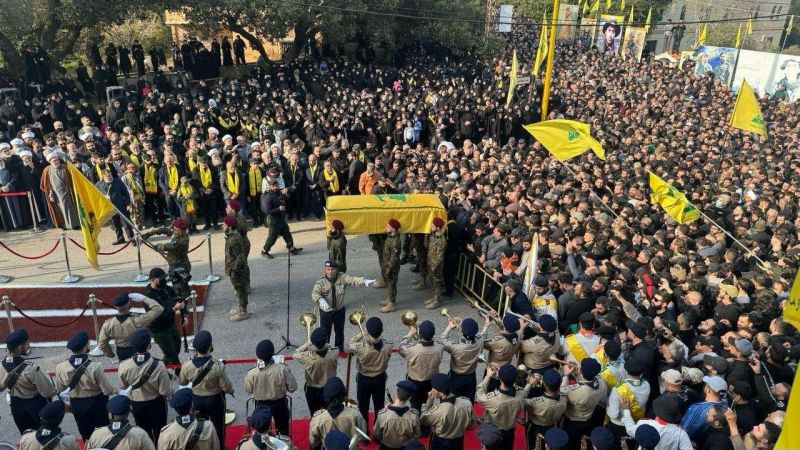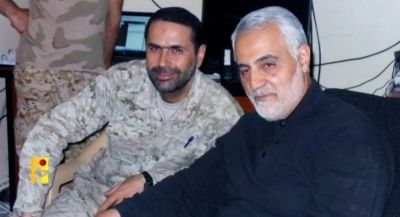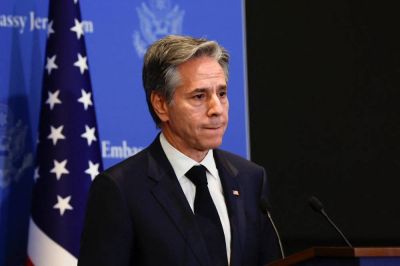
Funeral of slain Hezbollah commander Wissam Tawil at Khirbet Silm, in the district of Bint Jbeil, south Lebanon, Jan. 9, 2023. (Credit: Muntasser Abdallah/L'Orient Today)
BEIRUT — Hezbollah mourned the death of one of the party's commanders Wissam Tawil "in a massive procession" that started from his residence, and extended to the center of the town of Khirbet Silm (Bint Jbeil district), Tawil's hometown, the party said in a statement.
Among those who participated were Central Council member of Hezbollah Sheikh Nabil Kaouk and several Hezbollah MPs, former MPs, "as well as several scholars, families of martyrs and a large crowd of locals from various neighboring towns of Khirbet Silm," the party added in the statement.
On Monday, Tawil was killed in an Israeli strike that targeted his vehicle in Khirbet Silm in southern Lebanon.
Tawil is the highest-ranking official to be killed since the party started hostilities against Israel in support of its Palestinian ally, Hamas, in the wake of the Oct. 7 attack.
According to a security official who spoke to AFP on condition of anonymity, Tawil played a leading role in the military operations taking place in southern Lebanon.
Hezbollah spokeswoman Rana Sahili had initially told L’Orient Today that “Tawil was a military commander, nothing more and nothing less,” and refused to comment on his link with the Radwan unit or the party’s upper echelons.
That evening, Hezbollah published a biographical note on Tawil, quieting comments that played down his role within the party.
Last week, after an overnight strike in Naqoura, Hezbollah played down the assassination of Hussein Yazbeck, who was identified by observers as a “senior official,” in the party.
At the town square, a commemorative ceremony for Tawil was held. His coffin was wrapped in the Hezbollah flag and was carried by a group of fighters towards the main platform, while Imam Mahdi Scouts, affiliated with Hezbollah, played music in the background.
"Today, we proudly bid farewell to the martyr ... who comes from a family dedicated to faith, sacrifice, martyrdom and commitment to the cause," Kaouk said from the town of Khirbet Silm.
Tawil: Chief architect of '2006 war victory' against Israel
In his speech, Kaouk said that Tawil was "a lover of the resistance, who never left the battlefields for thirty years ... he was instrumental in the liberation of 2000."
On May 25, 2000, the Israeli army withdrew from territory in southern Lebanon, marking the end of the south Lebanon occupation by Israel (1985–2000). The withdrawal came after the continued attack on Israeli military positions in occupied Lebanese territory by Hezbollah forced them to withdraw.
Kaouk also said that Tawil "played a role in the operation in the year 2000 in Shebaa Farms and the 2006 operation."
In 2000, in Shebaa Farms, Hezbollah militants captured three Israeli soldiers while they were patrolling the security fence, and subsequently took them into Lebanon. Their bodies were returned to Israel in a prisoner exchange on Jan. 29, 2004 between Hezbollah and Israel.
The abduction was the first incident between Israel and Lebanon after the Israeli withdrawal from southern Lebanon. It was followed by several other attempts by Hezbollah to abduct Israeli soldiers at the border. Eventually, on July 12, 2006, a Hezbollah cross-border raid saw eight Israeli soldiers killed and another two abducted and later killed in Lebanon, which triggered the 2006 war in Lebanon.
"In the July [2006] war, he was among the chief architects of divine victory," Kaouk said.
Between July 12 and Aug. 14, 2006, Israel imposed a land, air and sea blockade on Lebanon, after Hezbollah operatives captured two Israeli soldiers in a cross-border raid, which they hoped would secure a prisoner swap deal with their Israeli counterparts. Israel responded militarily to retrieve the two soldiers and with the intent of destroying Hezbollah.
Over 34 days, Israel carried out thousands of air strikes while Hezbollah fired missiles into northern Israel.
UN Resolution 1701 helped end the war. This resolution was adopted following escalated fighting in the conflict’s final days, notably marked by an Israeli ground incursion into the south toward Marjayoun.
Kaouk explained that Tawil's role was not only in Lebanon but also in Syria where he fought ISIS " extremists and helped protect the locality and mausoleum of Sayyeda Zeinab in southern Damascus."
In 2012, Hezbollah officially announced that it had entered Syria to "defend Prophet Mohammed's granddaughter buried in Damascus from extremist groups that wanted to destroy her shrine," and viewed the mausoleum as "against Islamic teachings and should be destroyed," Hezbollah Chief Hassan Nasrallah had said in a speech in 2012.
Kaouk said that Tawil had received several medals and awards from Hezbollah "for his bravery as a soldier in the ranks of the party who demonstrated bravery when storming Israeli positions and bases, when south Lebanon was occupied by Israel pre-2000."
"For his contributions and achievements, he was awarded the Medal of Courage and Bravery more than once by the Secretary-General of Hezbollah, Sayyed Hassan Nasrallah," Kaouk said.
'Israel is unable to return settlers to the north'
Addressing Israeli prime minister Benjamin Netanyahu, Kaouk insisted that Israel is getting weaker or else it would have not "pleaded with America and Western countries to [help them] return settlers to northern settlements. Israel wouldn’t have begged the United Nations and major powers to implement Resolution 1701, or requested protection from America and 20 other countries to safeguard Israeli ships in the Red Sea."
In December, Netanyahu had said in an Israeli cabinet meeting that they "are working to restore security in the north and return the residents to their homes. This currently necessitates the continuation of the fighting there. If we don't achieve it politically, we will achieve it militarily."
According to Haaretz, Israel’s northern border communities have been emptying since Oct. 8, when clashes erupted between Hezbollah and Israel.
The Israeli defense ministry also ordered the mandatory evacuation of more than 40 communities there in October. The Israeli army has imposed a "no-go zone" within 2 km of the border with Lebanon.
"Our commitment to the martyr [Tawil] is that we will remain in the battlefield, supporting Gaza with our arms and the holiest blood of our martyrs. There is no language between us and the enemy except rockets and drones," Kaouk concluded.

